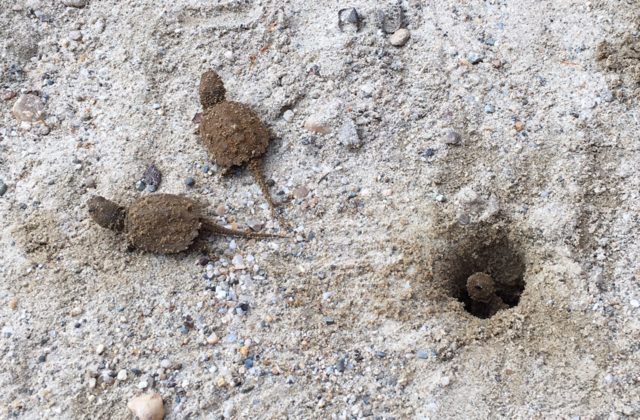Snapping Turtles Hatch on Public Beach at Tobey Pond
By Jude Mead
On the muggy evening of Saturday, September 10, Tobey Pond was surprisingly quiet. It was the last weekend of the season, yet only a handful of us took advantage of the hot weather to visit the town beach. But instead of cooling in the water or lolling on our beach towels, we all gathered around a quarter-sized hole in the sand, transfixed by baby snapping turtles hatching and wriggling their way to the water, one right after another. It took several hours before all forty of them swam off.
Jake Green was one of the four lifeguards on duty that day. He noticed the first baby turtle inching its way towards the shoreline earlier that afternoon. He described the moment, “ It blended in so well that I could barely see it. I was not sure where it came from and didn’t think much of it until two more appeared.” Green followed the turtle’s trail back to a small opening in the ground and saw several more trying to dig out of the nest.

Lifeguard Jake Green, sitting, first noticed the turtles hatching.
A tech savvy teenager, Green quickly searched “snapping turtle hatching” on his phone and learned that pregnant females dig shallow nests on land in the spring where they can lay twenty to eighty eggs. They cover them with sand for protection and then return to the water leaving the eggs and hatchlings to fend for themselves. It can take up to 90 days for the eggs to hatch.
Brian Hess, a wildlife biologist with the Department of Energy and Environmental Protection who specializes in the habits of turtles, confirmed Green’s findings. After hearing my description, he said the turtles were most likely snappers because of the relatively long tail. According to Hess, witnessing the occurrence is rare because most eggs do not survive to hatching. “Turtle nests are often preyed upon by skunks or raccoons or other predators. Even crows will sometimes scratch away the sand to eat the eggs,” Hess said.
He went on to explain that the vast majority lucky enough to hatch and make it to water would probably not survive to adulthood. Fish or other snapping turtles will eat most. If they are part of the 10 percent that do make it Hess said, they can “grow to be 35 pounds with a shell that can reach 12 inches long and they can possibly live to be 80 years old.” The longevity of mature snapping turtles is possible because adult turtles have no predators.
News of snapping turtles makes many of us uneasy. They are almost entirely aquatic and prefer some of the same ponds, lakes, streams and slow moving water as swimmers. But Hess said while it may seem a little disconcerting to swim in a body of water with a 35- or 40-pound “snapper,” people should not be afraid. “We never get emergency calls about a snapping turtle taking a curious bite out of a person. Most turtles want to be left alone and being fast swimmers will quickly flee the area [of any swimmer],” he said. Another reason most swimmers should not fear snapping turtles is that they are nocturnal and spend most of their daytime hours underwater on the muddy floor.
Problems can occur on dry land when the snapping turtle roams and is most vulnerable, therefore most aggressive. Hess advises against approaching a snapper out of the water. “ Do not go near it. They can be aggressive and have razor sharp teeth with incredible jaw strength,” he warned. However, he noted that most snapping turtles move to dry land during breeding season and only for a brief time.
According to Hess, snapping turtles have shown themselves able to adapt to an ever changing landscape and are important for keeping the fish, insects and reptile populations under control. Thus, it is comforting to know that their frightful reputation is mostly mythical. For Jake Green, and the rest of us at Tobey that day, the experience of seeing baby snapping turtles instinctively make their way to the water was simply, as Green said, “awesome.”
Photographs and videos by Jude Mead.

